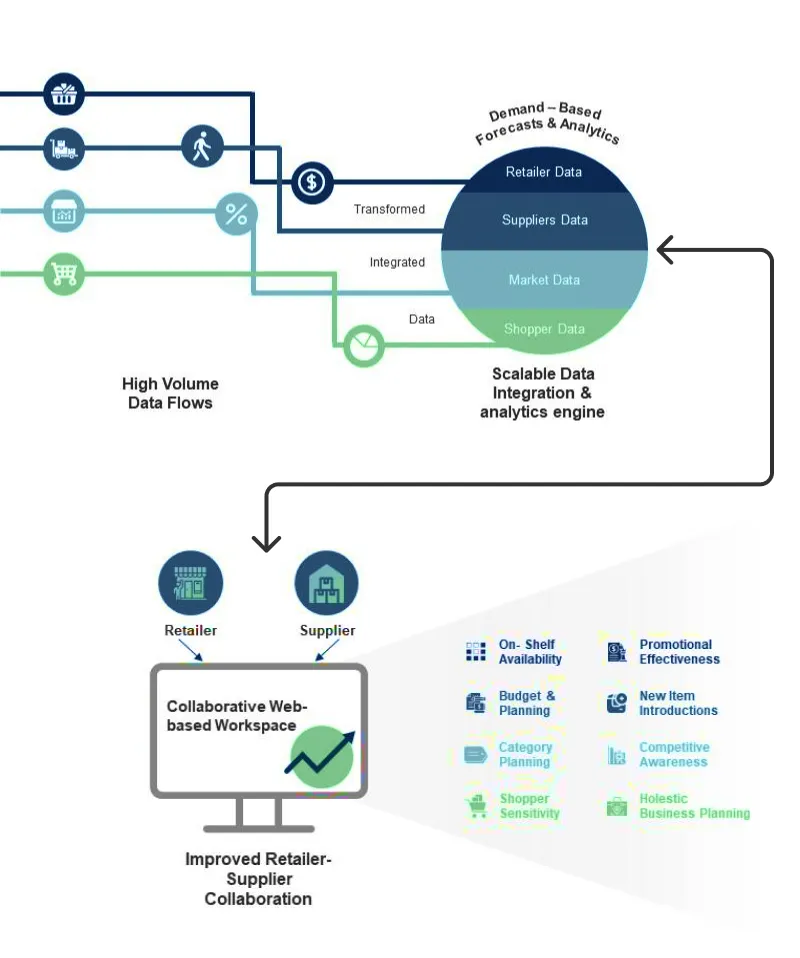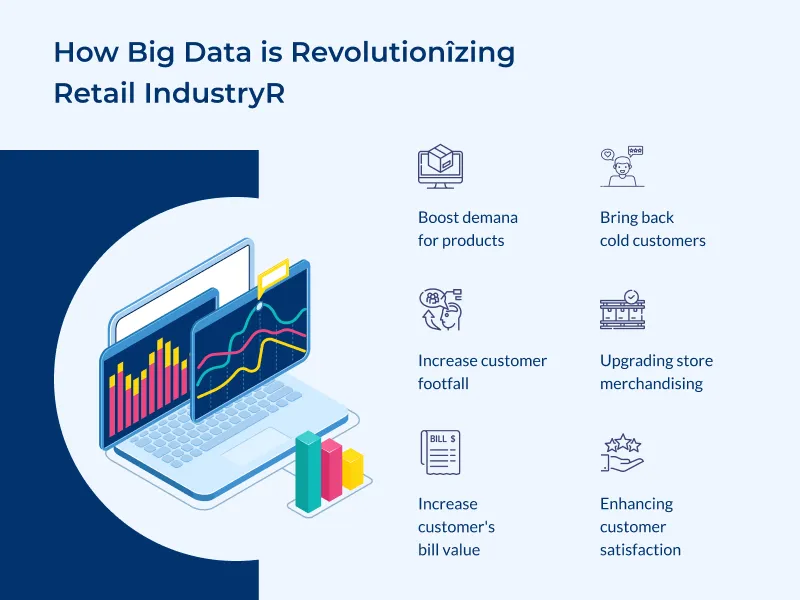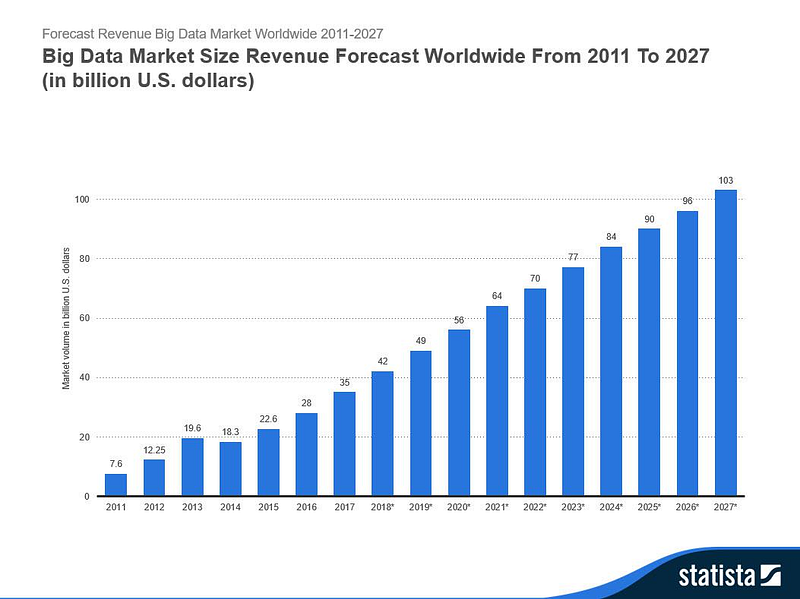In a world where online retailers like Amazon are soaring to new heights, brick-and-mortar stores grapple with staying afloat. The key to survival lies in understanding customers like never before and meeting their needs with precision and finesse. This is where the transformative power of Big Data Analytics in the Retail Industry emerges as a savior.
Many retailers are embracing the cutting-edge tools of big data analytics to unveil invaluable insights about their customers and shopping habits. By doing so, they not only enhance their existing customer base but also draw in fresh patrons, boosting revenue and reshaping the retail landscape.
A recent groundbreaking study conducted by McKinsey revealed that leveraging big data analytics could elevate retail operating margins by a staggering 60 percent. The potential lies in unlocking the goldmine of knowledge hidden within vast data sets, arming businesses with the know-how to make well-informed decisions, and elevating the shopping experience to uncharted heights.
As the retail industry witnesses an unprecedented shift, the allure of big data analytics has ensnared the attention of retail marketers. This rapidly growing trend fuels the relentless pursuit of data-driven strategies to revamp marketing efforts and steer businesses toward unparalleled growth. In this riveting blog, we explore the myriad advantages of Big Data Analytics in the Retail Industry and unveil how these businesses are boldly transforming their destinies through the power of data.
Before starting this, let’s seek the expectations of a retail business from big data analytics …
In this modern era, many companies have set the wrong goals for their big data analytics projects and failed to succeed in the long run. Have a look at some important goals below:
To Improve Customer Experience
Big data gather customer insights and then uses those insights to improve the customer experience. For example, retailers can use big data to understand what customers say about them online and use that information to improve their products or services.
To Increase Sales
Big data identifies trends and patterns that further increase sales. For example, retailers can use big data to understand what products are selling well and stock more of those items.
To Improve Operational Efficiency
Big data helps streamline operations and make them more efficient. For example, retailers can use big data to track inventory levels and change their stock management processes accordingly.
To Reduce Costs
Big data identify areas where costs can be reduced. For example, retailers can use big data to understand where they are overspending and then adjust their budgets accordingly.
If retail businesses keep these goals in mind, they will be more likely to get the most out of their big data analytics projects.
Also Read: Big Data VS Business Intelligence: Must Watch Differences Between The Two Platforms [Infographic]
Role Of Big Data Analytics In the Retail Industry

Retailers are no longer trying to predict what you might be interested in buying. User behavior is being looked at to know what they want. They’re using algorithms and predictive analytics to understand their customers better. By doing this, they can offer a unique shopping experience that stands out from the crowd and keeps customers returning for more.
Big data analytics analyzes large data sets to find patterns and trends. Retailers can use big data analytics to understand their customers better, what they want, and how they behave. It helps in making better pricing, product selection, and marketing.
Big data analytics is already having a transformational effect on the retail industry. Retailers using big data analytics can make more informed decisions that improve profit and a stronger competitive position.
Read Related Blog: Big Data Analytics In Retail Industry
Advantages Of Big Data Analytics
The data-driven strategy has become the norm for successful businesses, and the retail sector is no different. Big data analytics help retail businesses make better decisions, understand customers, and ultimately improve their bottom line.

Easy and Cheaper Storage Facility
Big data is becoming easier to store, with storage space becoming cheaper daily. Now, you can invest in ample data storage on a large scale. Managing the data effectively and making it useful for analytics is the core focus for retailers at this point.
Harnessing the immense potential of data to optimize operations & boost sales
Data Available From Every Device
The increasing number of devices, such as mobile phones and tablets, has increased the amount of data being created. Every level of customer interaction is recorded in big data for retail.
Every customer’s purchase history can be observed and analyzed to understand his preference. The volume of data is huge, and this has to be segregated to be made more useful.
Improved Level Of Personalization
Understanding the exact preferences of the consumer is now possible with big data solutions. The return on investment shoots up considerably with increased personalization for the consumer. Since consumers are interested in offers and discounts, so they do not find sharing their details difficult. The best-suited offers can be provided to the customer based on business intelligence.
Customer Segmentation
Finding the most profitable customers is one of the most challenging aspects of retail. Ensuring the most important customers get the attention they deserve is a must. One of the major advantages of big data is that it enables you to place proper customer segmentation in place to provide relevant offers to those customers.
Right People, Right Time
Big data effectively reach the right set of people with the right messaging. Big data uses specific audiences to bring out the best conversion rate for a retail business.
Many retail marketers cannot bring out the right results for the business because they lack an understanding of making the data usable and analyzing it. We must fully prepare the technology for big data usage and integration.
The Internet Of Things & Big Data
The Internet of Things is one of the most popular and recent trends in big data that is helping the retail industry and driving consumer engagement. The IoT devices easily connect with the in-data systems to generate data about consumer behavior and actions. IoT technology has been a boon for retail, making it easier to gather customer data.
Also Read: 9 Ways Blockchain IoT Union Help Elevate Your Business Value
Provides Targeted Communication To Customers
Personalized marketing is 20% more effective with Big Data Services than traditional marketing practices. Data analysis helps companies track the buying process and capture past purchases of customers, which they use to target them with personalized communication.
A lot has changed in retail since manufacturers started using data to make their products better tailored towards specific demographics or needs; now, it’s not uncommon that marketers will crack open your credit card history before jumping into an online checkout flow!
Predicts Demand And Managing Inventory
Data analytics and Big Data development enable retail companies to understand the customers’ buying needs and focus on areas with high demand. The conclusion derived from the data has helped many retailers. They better understand what their target audience wants to strategically plan out the inventory levels — keeping themselves ahead in this fast-paced industry.
Optimizes The Price
The retailer stage depicts the price of a product that gradually reduces after demand has subsided. However, it becomes more effective if you don’t reduce your prices during off-season periods or timeframes.
Using big data analytics, retailers can track customer spending patterns and preferences to gauge the prices most appeal to their customers.
They can also use big data analytics to track inventory levels and sales rates to ensure they are not overstocking or understocking products.
If you want to leverage the perks of all of this booming trend, you can embrace Big Data development services in upcoming years. However, embracing it as soon as possible is admissible to gain competitive advantages.
Also Read: Mastering Mobile BI Solutions: Top Tools, Benefits & Best Practices
Enhances Customer Experience
Data analytics helps retailers analyze how customers shop and use this data to produce a seamless customer experience. From choosing the product and updating account details like shipping address or payment method, all these tasks become easier with Data Analytics.
Many companies nowadays make it easy for their clients through convenience features. It features within each platform they provide access to, such as online order processing, where you can select from available options before buying.
Moreover, you can buy without entering personal information besides what’s already there. Plus, just check out quickly by providing basic info about yourself (like Order ID) if needed.
This process saves time and effort in re-entering new data with allocation at other places during busy work schedules.
Retain Customers
Retaining customers is not an easy task. It requires constant attention and focuses on what will keep them interested in your brand. It requires how you can engage with their needs or interests long-term. In this way, they become loyal patrons of yours instead of someone who spends time elsewhere doing business (sleepless nights).
Data analysis helps identify those people who disengage by identifying patterns. An example of this includes frequent buying habits. These insights give retailers insight into introducing offers that may interest the customer to make purchases again while retaining current ones.
Related Post: Applications of Big Data Marketing Analytics
Real-Time Use Cases Of Big Data Analytics In the Retail Industry
1. Walmart uses big data analytics to track inventory levels and predict customer demand. This has helped them reduce out-of-stock by 20%.
2. Target is using big data analytics to personalize its marketing campaigns. They send customized coupons and ads to customers based on their purchase history.
3. Amazon uses big data analytics to recommend products to customers and optimize their search results.
4. Nordstrom is using big data analytics to improve the in-store experience for customers. They track customer movements throughout the store and use this information to change layout and product placement.
5. Best Buy uses big data analytics to price match competitors and offer personalized deals to customers.
As you can see, big data analytics is already having a big impact on the retail industry. In the future, it will only become more critical. Retailers who embrace big data analytics can understand their customers better and give them what they want. This will be key to surviving in the competitive world of retail.
Our analytics team can help.
Future Of Retail Industry With Big Data Analytics

IMg src: Statista
The future of retail is here, and it’s being powered by big data analytics. This cutting-edge technology transforms retailers’ operations, allowing them to make real-time decisions based on customer behavior and trends.
Big data analytics gives retailers a wealth of insights into their customers, including what they want, how they shop, and when they’re likely to make a purchase. This information is then used to improve the customer experience, drive sales, and increase profitability.
There’s no doubt that big data analytics is revolutionizing the retail industry. With its ability to provide insights that can improve every aspect of a retailer’s operations, it’s clear that this technology is here to stay.
Also Read – Data to Lifesaving Impact: Reshaping Medical Supply Management with Blockchain
Conclusion
The retail industry is transforming thanks to big data analytics. By harnessing the power of data, retailers can gain valuable insights into customer behavior and preferences. This lets them make more informed inventory, pricing, and promotions decisions. As a result, the retail industry is becoming more competitive and efficient.
Big data analytics is also helping to create new experiences for customers. Retailers are using data to personalize the shopping experience and offer targeted recommendations. Big data analytics is changing how the retail industry operates, and it is revolutionizing the shopping experience for consumers.
Leverage Big Data Services Benefits From ValueCoders
ValueCoders is a leading offshore software development company with over 18 years of experience providing software development services to clients from various industries, including retail. Some of the big data analytics benefits that retailers can expect to see from working with ValueCoders include:
Improved customer targeting and segmentation: By analyzing large amounts of data (including customer demographics, purchase histories, and social media insights), retailers can get a better understanding of who their customers are, what they like to buy, and how best to reach them. This allows for more accurate targeting of ads and promotions and more personalized customer service.
Increased sales and profitability: By taking advantage of predictive analytics capabilities, retailers can identify trends and patterns in customer behavior that can boost sales and drive profits. For example, they can identify which products are selling well and stock up accordingly or target customers likely to make a purchase based on their past behavior.
Improved supply chain management: Big data analytics can help retailers track inventory levels and demand patterns in real time, making more informed decisions about production and distribution. This can lead to reduced costs and improved customer satisfaction thanks to shorter delivery times.
Enhanced security: Retailers can use big data analytics to monitor suspicious activity, such as unusual behavior patterns or purchases. This can help them flag potential fraud or security threats before they cause any damage.
There are several reasons why retailers might want to take big data analytics services from ValueCoders. Here are some key reasons:
1. We have a team of experienced big data analysts who can help you make sense of your data and extract valuable insights that can help you improve your business performance.
2. We have the latest big data technologies and tools at our disposal, so we can help you harness the power of big data to get better insights into your customers, their buying behavior, etc.
3. We are experts in tailoring big data solutions to meet the specific needs of retail businesses, so you can be sure that you’re getting the most value from your analytics investments.
Contact us today if you’re looking for a big data analytics and data analytics partner to help you take your retail business to the next level. We’ll be happy to discuss your specific needs and requirements and tailor the right solution for you.





